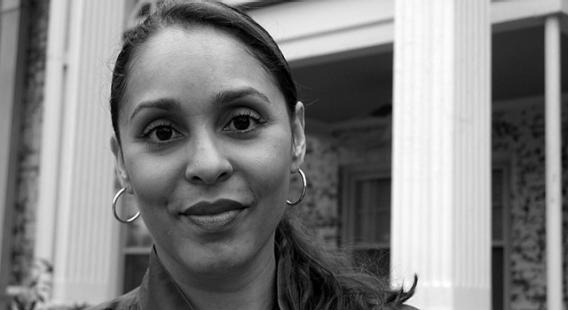Natasha Trethewey, the new poet laureate of the United States, knows how to end a poem. Her work runs along two tracks—the personal and the historical—that converge somewhere around the last line. The moment’s a revelation because while she’s reading you get the sense she’s feeling her way, worrying charged words like father, blood, light, and dark, nervous about what she’ll find. When she finds that our grand historical narratives are made up of people who feel intensely—and that these stories are not always kind to the human beings acting them out—you’re left feeling sad and connected, which is a pretty good way for poetry to make you feel.
On Thursday night, Trethewey addressed a packed crowd in the Library of Congress’s Thomas Jefferson building. She was opening the 2012-13 literary season. So many fans came to celebrate that a group of us had to watch her on TV in an “overflow room.” The audience was younger than I expected, and more diverse. I saw kids in lanyards snapping pictures on their iPhones, scruffy loners in thick glasses, girls in leggings, women in headscarves, married couples in jackets and heavy jewelry. In line for a seat, I spoke to a researcher at NIH who studied false zeroes in data sets and wrote poetry on the side. Her favorite author was Louise Glück. Behind us stood an English professor at a nearby university, who said he was looking forward to the wine at the reception afterward. When we finally sat, the middle-aged blonde behind us whipped out a device and spent the rest of the event jabbing furiously at its screen. She was shushed—to no avail—by a silver-haired lady in pearls. (“Ma’am, that is distracting.”)
Trethewey emerged from a magical-seeming contraption that slid open at the back of the auditorium. (The librarian of Congress, Dr. James Billington, just walked on stage from the wing.) She wore a conservative black dress and smiled a lot. When she began to speak, her voice, like that of the beautiful companion in “Adam’s Curse,” was sweet and low. Also like that woman, she was preoccupied by the costs of loveliness—the gemmed portraits of mixed-race families in a Mexican taxonomy book, the siren song of a father’s affection. (Trethewey feared that her white dad loved his half-black daughter primarily because he felt he “made [her] better.”) “Always there is something more to know,” she recited, before laying out a critique of the quest for limitless knowledge and control. She prefers the mysteries of negative space, the “white … hovering beneath the words, silent, incendiary, waiting.” And she embraces humor as a subversive tactic: “This poem comes out of a photograph of me as a child, sitting on a mule,” she explained at one point. “That’s funny, but I’m not going to explain the joke.”
Afterward, the crowd streamed upstairs for wine, cheese, crackers, and copies of Thrall, the 19th poet laureate’s newest book. Here are some words people used to describe her reading: outstanding, powerful, moving, dense, too lengthy, too short, repetitive, special. “She took me to places I hadn’t been before,” said a woman with a coffee complexion in a long evening gown. Another man looked quizzical and then smiled. “I liked it,” he said. “But what do I know? I’m an economist.”
